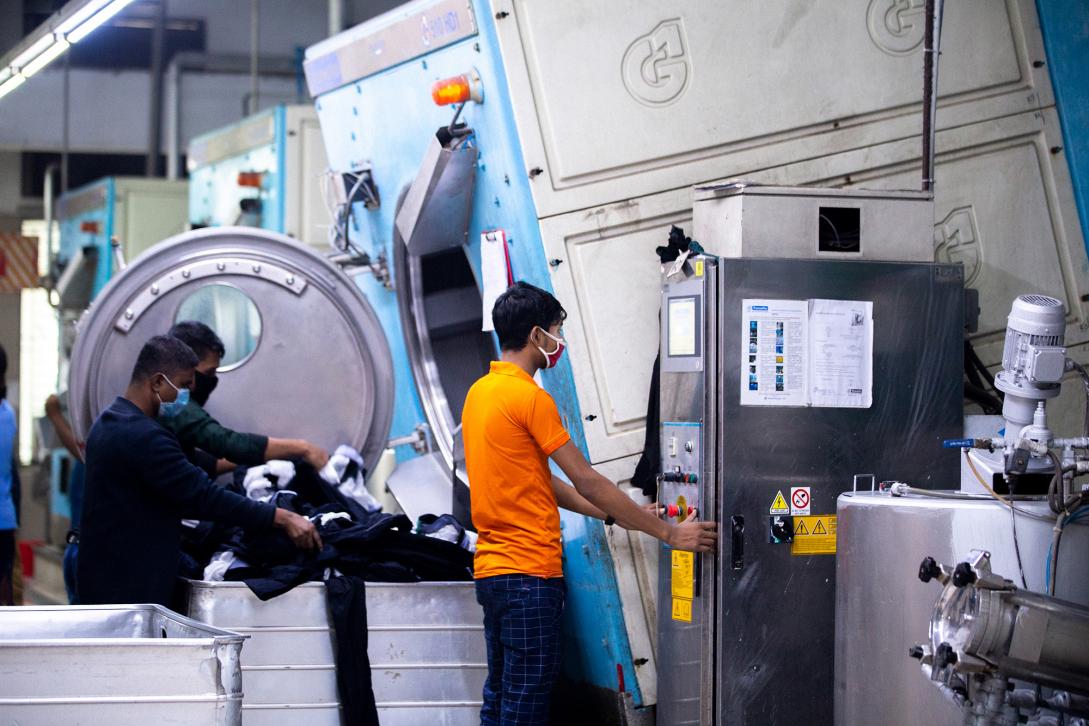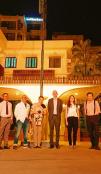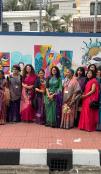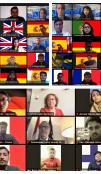EU and Germany join forces with the Government of Bangladesh to support unemployed factory workers in RMG and Leather sector

Millions are left without work as the COVID-19 has caused an unprecedented economic crisis for global economies. Factory workers in the Readymade Garments (RMG), Leather and Footwear industries who have lost their jobs or seen income cuts are receiving financial support from the Government's Social Protection Programme for Unemployed Workers, supported by the European Union and Germany.
Shapna Khatun (28), an employee of a woven fabric factory in Savar, left her workplace during the COVID-19 pandemic to save her life, but ended up losing her livelihood. As she couldn’t return to her work due to the lockdown, she lost her job. Shapna is struggling as she has too many mouths to feed, including a school going child and old parents-in-law.
“My parents-in-law are aged. We couldn’t provide them with the regular medical care they needed,” said Shapna. “I never imagined that I would have to see such days when I wouldn’t be able to buy stationeries for my son. My husband has a temporary job to make ends meet, but that is not enough.”
Md. Shafiqul Islam’s (32) story is not very different from Shapna. He is the sole breadwinner for the family of six. After being unemployed for the same reason as Shapna, he didn’t have enough money to feed his family properly.
“We used to eat twice instead of three times a day to save money. My wife and I started eating less than we needed. I couldn’t buy medicine for my sick father either during the lockdown.” says Shafiqul.
The RMG, Leather and Footwear industries in Bangladesh are the main contributors to the country’s GDP. These sectors were hit hard by the COVID-19 pandemic fallout. Many factory owners had to lay off their workers without prior notice or salary.
Thousands of affected workers like Shapna and Shafiqul from RMG, Leather and Footwear factories are now receiving a monthly amount of 3000 taka for a period of three months. This benefit is made available under the Government’s “Social Protection Programme for Unemployed and Distressed Workers in the RMG, Leathergoods and Footwear Industries”, established in October 2020 with the support of the European Union and Germany.
The programme is managed by the Department of Labour under the Ministry of Labour and Employment. The eligible workers are identified in coordination with the employers’ associations, which include Bangladesh Garment Manufacturers and Exporters Association (BGMEA), the Bangladesh Knitwear Manufacturers and Exporters Association (BKMEA), the Leathergoods and Footwear Manufacturers & Exporters Association of Bangladesh (LFMEAB) and the Bangladesh Finished Leather, Leathergoods and Footwear Exporters' Association (BFLLFEA). Transfers are processed through G2P and sent to the bank or mobile accounts of the beneficiaries.
“This money is not a lot, but still it is a life-saver,” says Shapna, “but at least, I can still ensure uninterrupted education for my son and medication for my in-laws.”
Shafiqul says he can now provide food for his family three times a day with this support.
The European Union is providing this support together with Germany as part of the Team Europe approach to fight against the economic fallout during the COVID-19 pandemic. The EU and Germany are mobilising EUR 113 million (nearly 1,130 crore Taka) as budget support to the Government of Bangladesh.
The EU Ambassador Rensje Teerink says, “Team Europe is committed to working with Bangladesh to strengthen and boost the resilience of its national social protection programme, which is indispensable to protect vulnerable workers who lost their jobs in key export sectors following the COVID-19 pandemic.”
“This is part of the European Union’s longer-term efforts to establish adequate, permanent social security for workers, and thereby contributing to building and preserving Bangladesh’s human capital,” said the Ambassador.
The German Ambassador, Peter Fahrenholtz, added: “Social protection schemes are an important instrument for reducing poverty and inequality. They do not only help individuals and their families to cope with crises and shocks, and prevent them from falling into or remaining in poverty in the short term. They also contribute to economic development by raising labour productivity and enhancing social stability in the medium and long term. Bangladesh is at a crossroad-emerging from poverty and is achieving stability. Germany is working closely with other stakeholders to make this transition smooth for Bangladesh. The scheme funded by the EU and Germany may lay the foundation for a longer-term social security mechanism for Bangladesh and contribute to its prosperous way towards becoming a middle- and high- income country.’’
Mr. Sofiqul Alam Sarkar, the AGM- Admin and Operations of the Civil Engineers Limited, is happy with this support from the European Union. He says, “Workers are our most valuable asset. If they live well, our factory functions well. We couldn’t ensure jobs for those who left work during the lockdown. This support from the EU and the German government is saving our workers’ lives with a great assistance to our factory and also to the overall economy of the country. However, a more sustainable support system is required to better support them.”
Both Shapna and Shafiqul hope to find a job soon again. Shapna says, “We are grateful to the Government and the donors for supporting our lives. This has changed the miserable lifestyle we had in past months.”
#Coronavirus #EUSolidarity #StrongerTogether #TeamEurope





